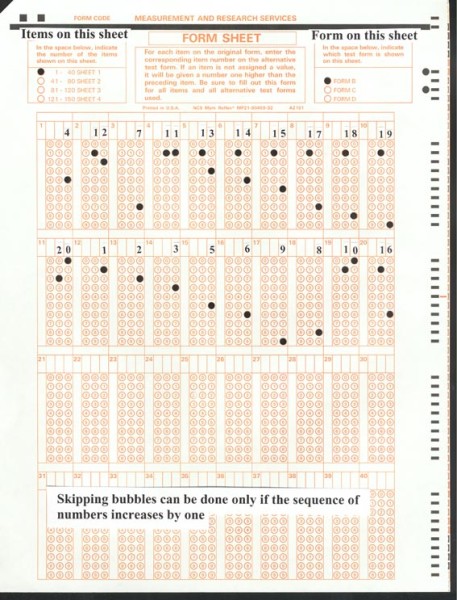Testing, Testing, 1, 2, 3
Admit It! No one likes standardized testing. None of you wake up on a Saturday morning and think to yourself, what I’d really love to do today is spend hours locked in a room, filling in bubbles on an answer sheet, taking a test that plays a part in determining my future. We understand; all of us took an SAT or an ACT (or both). None of us count it among our happiest memories. But as admission officers, we do recognize the greater purpose in standardized testing. While certainly not without its pitfalls, standardized testing does help us gather information upon which to make some very important decisions.
A number of people asked us to provide more insight into how we utilize the SAT and ACT in our process (great suggestion @Sarah and @Tiffany). We view standardized testing as one component of your application; no more than that, and no less than that. Your four year record in high school is more important to us than your four hour record on a Saturday morning. But, like any other component of the application (transcript, extracurricular activities, recommendations, essays, etc.), standardized test results can make your application more or less competitive than others. The bullet points below provide more detail into exactly what we require and how we make use of standardized testing in our process.
Required Testing
- An SAT or an ACT
- We have no preference for one exam over the other
- For the SAT: we will review your best Critical Reading and your best Math score even if they come from different test dates and the middle 50% of our students score between 1270-1460
- For the ACT: we will review your best composite score; we do not review the individual subscores, and the middle 50% of our students score between 28-32
- We do not require you to take the writing component of the ACT
- TOEFL: required for international transfer applicants, and we like to see a score of 100 or higher on the internet-based exam
Optional Testing
- SAT Subject Tests
- If you do submit them, we will review them
- SAT Subject tests (specifically in math and lab science) are highly recommended for homeschool students
- AP Exam Scores
- If you do submit them, we will review them
- TOEFL: Highly recommended for international freshman applicants for whom English is not your first language
Submission of Standardized Tests
- Your SAT and ACT results need to be submitted to W&M directly from the testing agency
- If you choose to submit a TOEFL result, that should also be submitted to us directly from the testing agency
- SAT Subject Tests and AP exam scores can be either submitted directly from the College Board with your other results or can be self-reported through the Common Application
Our best advice, try each exam once during your junior year. Then, take whichever exam you did better on a second time. Generally, about one-third of students do better on the SAT while another third do better on the ACT (the final third do equally well on both exams). Trying each exam allows you to see if one is more suited to your abilities than the other. Starting early gives you the time to retake an exam should your first attempt not go as well as you had hoped. And most importantly, don’t overthink it. This is not the test that determines the rest of your life. It’s one small part of a much larger process.
Wendy Livingston ’03, M.Ed. ‘09
Associate Dean of Admission
Comments are closed on posts older than one year, but we still want to hear from you. If you have a comment or question for us, please email admission@wm.edu.



What about the Writing portion of the SAT and the SAT essay? I scored well on both (760 on Writing and an 11 essay score). It seems like many colleges and universities overlook the Writing section and put more emphasis on the other two sections. Writing is something that I excel at, and I’d like to know that it’s not just being pushed aside.
@Colton, we see your SAT Writing score but we primarily use the essay included in the Common Application to assess a student’s writing ability. It’s not that we overlook the Writing section, it’s just that we believe the essay is the best way to review an applicant’s strengths and weaknesses in that area.
Thanks for clearing that up for me! As someone said before on another blog entry, an in-depth article about the personal essays would be a great help. I’m sure it’s been covered time and time again on this blog, but I could use any tips you guys could possibly give us!
@Colton, we have blogged pretty thoroughly about essay writing. If you type “essay” into the search box at the top of the W&M Blogs page, it will generate several pages of blogs we’ve written over the years about all things essay. So that’s a good start.
Are you kidding? I love standardized tests! (I know. I’m weird.)
Agree with Colton, though – as someone who also traditionally does well on the writing section (the multiple choice, not the essay), it’d be nice to know that that carries some weight. Doing well requires being somewhat decent at English, with more mechanical stuff than the reading section asks for, which is pretty important. I think they got rid of the writing section, but do you think that’s a useful component in determining students’ future success?
@E, liking standardized tests is a good feature in a high school junior and senior! We do believe the ability to write is a useful tool in determining success in college. As we mentioned previously, we use the Common Application essay (and our optional essay if responded to) to best evaluate a student’s writing abilities. We do see the SAT overall writing score but focus primarily on the Critical Reading and Math since there’s another application tool for reviewing writing.
Hello, I was the person asking if William and Mary has a preference for the SAT over the ACT. I recently got the chance to talk to my school counselor and he told me colleges always have a preference for the SAT. This is giving me a lot of stress because I only prepped for the ACT this summer because I feel more comfortable with it. Should I take the SAT just in case but score not as high as I score on the ACT? Thank you for your advice and for taking the time to read this!
Hello! I was wondering if demonstrated interest was taken into account during the application process. Also, I was wondering if William and Mary focuses on certain parts of the ACT, as I have heard that they care more about the writing and math section, which I hope is not just a false rumor. Thank you for your time! Have a fantastic day!
@RJ, we do not use demonstrated interest in our process. As for the ACT, as we mentioned above we focus on the composite score and do not review individual subscores.
Hello,
Can you tell me how much, if any, consideration is given to legacies. My Mom is an alumna of W&M and although I am out of state, I have always wanted to attend. Thank you.
@Sandy, we’re glad you’re looking at W&M and thinking about continuing the family tradition. We consider being a legacy (defined for us as having had a parent attend W&M) a plus factor in your application. Many things can be plus factors and legacy is one of them. If a student isn’t competitive for admission, being a legacy doesn’t change that but it’s something that works in an applicant’s favor during our review process.
One more legacy question if you don’t mind. When you say “having had a parent attend W&M,” does that include the graduate/law schools as well? In other words, if you had two equally competitive students applying to W&M for undergraduate education, and one had a parent that went to the college and one who had a parent that just attended one of the graduate schools, would the first be considered a legacy or would both be considered a legacy (and therefore, for all intents and purposes be considered the same legacy-wise)?
@Scott, legacy refers to a parent who attended any part of W&M whether as an undergraduate or graduate student. So a student whose parent has a BA from W&M and a student whose parent got a JD would both be legacy applicants.